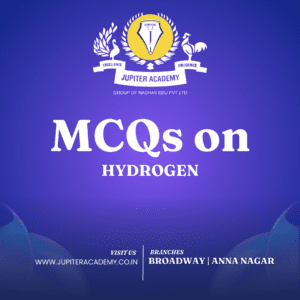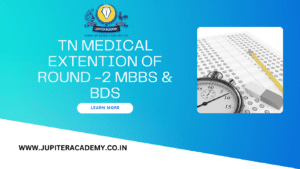Advisory and Instructions on Updation of Aadhaar Card/ UDID Card/...
Read MoreNEET MCQS ON HYDROGEN

Hydrogen is an important topic in the NEET exam, and students are expected to have a good understanding of its properties, reactions, and applications. Some of the important hydrogen chemistry topics for the NEET exam include:
- Occurrence and isotopes of hydrogen
- Preparation of hydrogen
- Physical and chemical properties of hydrogen
- Hydrides
- Water
- Hydrogen peroxide
Occurrence and isotopes of hydrogen
Hydrogen is the most abundant element in the universe, but it is rarely found in its free state on Earth. It is mostly found in the form of compounds, such as water, methane, and ammonia. Hydrogen has three isotopes: protium, deuterium, and tritium. Protium is the most common isotope, accounting for about 99.98% of all hydrogen atoms. Deuterium and tritium are rare isotopes, accounting for about 0.02% and 10^-17% of all hydrogen atoms, respectively.
Preparation of hydrogen
Hydrogen can be prepared by a variety of methods, including:
- Electrolysis of water: Water can be electrolyzed to produce hydrogen and oxygen gases. This process is used to produce hydrogen on a large scale.
- Reaction of metals with acids: Metals, such as zinc and iron, can react with acids to produce hydrogen gas. This method is often used in laboratory demonstrations.
- Steam reforming of methane: Methane can be reacted with steam to produce hydrogen and carbon monoxide gases. This process is used to produce hydrogen on a large scale.
Physical and chemical properties of hydrogen
Hydrogen is a colorless, odorless, and tasteless gas. It is the lightest element in the periodic table. Hydrogen is highly flammable and can react with many other elements to form compounds.
Hydrides
Hydrides are compounds of hydrogen and other elements. Hydrides can be classified into three types: ionic hydrides, covalent hydrides, and interstitial hydrides.
- Ionic hydrides: Ionic hydrides are formed between metals and hydrogen. They are typically white solids that are soluble in water.
- Covalent hydrides: Covalent hydrides are formed between non-metals and hydrogen. They are typically gases or liquids.
- Interstitial hydrides: Interstitial hydrides are formed between hydrogen and metals that have a transition metal structure. They are typically hard and brittle solids.
Water
Water is the most common hydride on Earth. It is a colorless, odorless, and tasteless liquid. Water is essential for life and has many important properties, such as its high heat capacity and ability to dissolve many substances.
Hydrogen peroxide
Hydrogen peroxide is a pale blue liquid that is slightly more viscous than water. It is a strong oxidizing agent and can be used as a bleach or disinfectant.
Students should be familiar with all of these topics in order to do well on the NEET exam. They should also be able to apply their knowledge to solve problems related to hydrogen chemistry.
NEET MCQS ON HYDROGEN
Here are some multiple-choice questions (MCQs) related to the topic of hydrogen that you may encounter in the NEET (National Eligibility cum Entrance Test) for medical and dental admissions in India. These questions cover various aspects of hydrogen, including its properties, isotopes, and applications.
1. Which of the following is the lightest element in the periodic table?
a) Helium
b) Hydrogen
c) Oxygen
d) Carbon
2. Hydrogen exists in three isotopic forms. Which one of the following is not an isotope of hydrogen?
a) Protium
b) Deuterium
c) Tritium
d) Helium
3. Which of the following is not a property of hydrogen gas (H2)?
a) It is colorless and odorless.
b) It is the most abundant element in the universe.
c) It is highly flammable and can burn in the presence of oxygen.
d) It is a good conductor of electricity in its gaseous state.
4. In the Haber-Bosch process, hydrogen gas is primarily used for the synthesis of:
a) Ammonia (NH3)
b) Methane (CH4)
c) Oxygen (O2)
d) Ethanol (C2H5OH)
5. Which metal hydride is commonly used as a hydrogen storage material in fuel cell technology?
a) Sodium hydride (NaH)
b) Calcium hydride (CaH2)
c) Lithium hydride (LiH)
d) Potassium hydride (KH)
6. Hydrogen gas is used as a reducing agent in the extraction of which element from its ore?
a) Aluminum
b) Iron
c) Copper
d) Zinc
7. What is the chemical formula of the compound formed when hydrogen gas reacts with chlorine gas?
a) HCl
b) H2Cl2
c) Cl2H2
d) HCl2
Answers:
1. b) Hydrogen
2. d) Helium
3. d) It is a good conductor of electricity in its gaseous state.
4. a) Ammonia (NH3)
5. b) Calcium hydride (CaH2)
6. a) Aluminum
7. a) HCl
These questions cover fundamental concepts related to hydrogen, its properties, and its applications. Remember to study the topic thoroughly for the NEET exam, as the actual questions may vary in difficulty and format.
HYDROGEN MCQ FOR NEET 2024

JEE MCQS ON HYDROGEN
Here are some multiple-choice questions (MCQs) related to the topic of hydrogen, which is commonly encountered in the Joint Entrance Examination (JEE) for engineering admissions in India. These questions vary in difficulty:
1. Which of the following properties of hydrogen gas makes it unique compared to other elements?
a) It is the lightest element.
b) It is the most abundant element in the universe.
c) It has the highest boiling point.
d) It is the most reactive non-metal.
2. Which process is commonly used to produce hydrogen gas on an industrial scale?
a) Electrolysis of water
b) Thermal decomposition of methane
c) Oxidation of hydrogen sulfide
d) Reduction of hydrogen chloride
3. What is the chemical formula of heavy water?
a) H2O
b) D2O
c) HDO
d) DH2O
4. Which of the following compounds is not a hydride of hydrogen?
a) CH4
b) H2O
c) NH3
d) H2S
5. Which of the following metals can form hydrides that are used as efficient reducing agents?
a) Gold (Au)
b) Aluminum (Al)
c) Silver (Ag)
d) Platinum (Pt)
6. Hydrogen gas is commonly used in the hydrogenation of vegetable oils. What is the purpose of this process?
a) To increase the calorie content of oils
b) To make oils solid at room temperature
c) To remove impurities from oils
d) To convert unsaturated fats to saturated fats
7. Which of the following is a key component of fuel cells that allows the generation of electricity from hydrogen and oxygen?
a) Electrolyte
b) Cathode
c) Anode
d) Catalyst
Answers:
1. b) It is the most abundant element in the universe.
2. b) Thermal decomposition of methane
3. b) D2O
4. b) H2O
5. b) Aluminum (Al)
6. d) To convert unsaturated fats to saturated fats
7. a) Electrolyte
These questions cover various aspects of hydrogen, including its properties, production, and applications. Remember that JEE questions can vary in complexity, so it’s essential to have a strong understanding of the topic for the exam.
NEET 2025: OMR Sheet Filling Tips to Avoid Mistakes
NEET 2025: OMR Sheet Filling Tips to Avoid Mistakes Preparing...
Read MoreTN Medical 2024 Counseling: Extension of Round 2 for MBBS & BDS
TN Medical 2024 Counseling: Extension of Round 2 for MBBS...
Read MoreNEET MCQS ON HYDROGEN NEET MCQS ON HYDROGEN NEET MCQS ON HYDROGEN NEET MCQS ON HYDROGEN NEET MCQS ON HYDROGEN NEET MCQS ON HYDROGEN NEET MCQS ON HYDROGEN NEET MCQS ON HYDROGEN NEET MCQS ON HYDROGEN NEET MCQS ON HYDROGEN NEET MCQS ON HYDROGEN NEET MCQS ON HYDROGEN NEET MCQS ON HYDROGEN
JEE MCQS ON HYDROGEN JEE MCQS ON HYDROGEN JEE MCQS ON HYDROGEN JEE MCQS ON HYDROGEN JEE MCQS ON HYDROGEN JEE MCQS ON HYDROGEN JEE MCQS ON HYDROGEN JEE MCQS ON HYDROGEN





